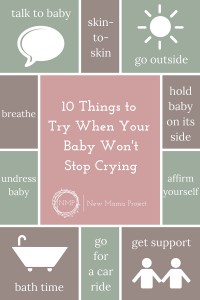My first baby cried a lot. I remember one day, about a month after he was born, when I felt like he cried all day. I tried to help him, but it seemed like nothing worked. As the day went on, I became increasingly frustrated and hopeless, and my ability to think creatively about how to help him went out the window. Logical thinking was overshadowed by exhaustion, frustration, and anxiety. My adrenaline was pumping and I was in flight mode at that point. I know how hard it can be to listen to your baby crying continuously with no end. It’s so hard to feel like you can’t help and the sound can became unbearable too. It’s hard to admit, but I even had negative thoughts towards him on that day. I moved from feeling frustrated with the situation to feeling frustrated with him. We ultimately got through it, but I wish I’d had some more options or ideas. As a brand new, overwhelmed mom, I just didn’t have enough tools for this situation. I wish I could have helped him more effectively as well as taken better care of myself through the process and remained a bit more level-headed.
I’ve learned a lot since then and my mindset has changed. I really have seen firsthand the truth behind the cliche, “this too shall pass”. Time and time again with my children, we are in the midst of a challenge, and then it passes. When I was new to this parenting gig, though, I hadn’t seen that yet, and it was hard to believe it would ever be different. Along with the understanding that each hard thing will come to an end, I’ve also learned some effective strategies for when a baby won’t stop crying. These are for those times when a feed, diaper change, swaddle, or rocking/bouncing motion just isn’t cutting it.
10 Things to Try When Your Baby Won’t Stop Crying
1. Undress him. Take everything off of your baby, including his diaper. Sometimes there’s something uncomfortable about your baby’s clothing and, of course, he can’t explain that to you. Let him be naked and free for a few minutes. You can also do a once over to make sure there’s nothing irritating him, like a hair wrapped around an extremity or an itchy bit of skin.
2. Try skin-to-skin. We hear a lot about the importance of skin-to-skin for the time immediately after a baby is born, but the benefits continue for many years. While baby is undressed, take off your shirt and hold him skin-to-skin. You can rock, walk slowly around, sway, lie down, or put him in a carrier against your skin. This sometimes calms babies and helps them regulate their heart rate and breathing.
3. Hold baby on her side or belly. This is a strategy that not everyone knows about. Sometimes rotating your baby so that her side rests on your arm or her belly rests on your arm/legs (if you’re sitting) can help settle her.
4. Go outside If it’s warm enough, take your baby outside. This gives her a change of scenery, smells, sounds, and some fresh air. It will also give you a chance to breathe that fresh air deeply into your lungs and hopefully calm you down a bit too.
5. Go for a short car ride. The movement of the car may be just the thing baby needs to help her calm down and settle into sleep. You’ll be able to tell if it’s working pretty quickly and it’s OK to abandon the idea if it doesn’t.
6. Try bathtime. Water can be incredibly therapeutic; the warmth, the weightlessness, the sound of the faucet running. Even better, get into the bath with your baby so you can hold her and both calm down together.
7. Center yourself by breathing. If you feel yourself getting frustrated and/or anxious, forgive yourself and know that it’s OK to feel that way. Then, stop what you’re doing. You can even put baby down somewhere safe for a moment, walk a few feet away (or just outside the room), and take a moment to breathe. Deep belly breaths, in which you breathe slowly and deeply to expand your belly, will tell your body that you are safe and help counteract that adrenaline rush. If you used breathing during labor, one of those exercises might help too.
8. Talk to your baby. Validate your baby’s feelings and remind him that you’re there to help and you love him. Tell him it’s OK to cry and you’ll get through this together.
9. Affirm yourself. I’m a big fan of self-affirmation and finding mantras. Remind yourself that you are loving your baby in this moment and that she is crying in the safety of your company and your arms. Repeat a simple mantra to yourself like, “this is hard, but it will get better” or “don’t forget to breathe”.
10. Get support. If somebody else is home, ask them to take care of baby for a while and go engage in some self-care. Leave the house for a walk or short drive if you need to clear your head. If you’re home alone with baby, call a trusted friend or relative to ask them to come over or to help or just to talk to you for a few minutes. You don’t have to do this alone and asking for help is a strong thing to do.
 Remember that nobody expects you to be perfect, and you shouldn’t expect that from yourself either. Babies cry and we can’t always figure out what’s wrong. If your instinct is telling you that there’s something bigger at play, you can of course see your pediatrician. If that’s not the case though, be gentle with yourself and your baby. Later today, we’ll be sending newsletter subscribers a link to a printable of this graphic to hang for quick reference during those intense crying moments. You can subscribe here if you haven’t already.
Remember that nobody expects you to be perfect, and you shouldn’t expect that from yourself either. Babies cry and we can’t always figure out what’s wrong. If your instinct is telling you that there’s something bigger at play, you can of course see your pediatrician. If that’s not the case though, be gentle with yourself and your baby. Later today, we’ll be sending newsletter subscribers a link to a printable of this graphic to hang for quick reference during those intense crying moments. You can subscribe here if you haven’t already.
We would love to hear from you too. Have you found any effective strategies for helping your baby when he or she is crying or for helping yourself stay centered during these times? Please share in the comments here or on our Facebook thread highlighting this post.

